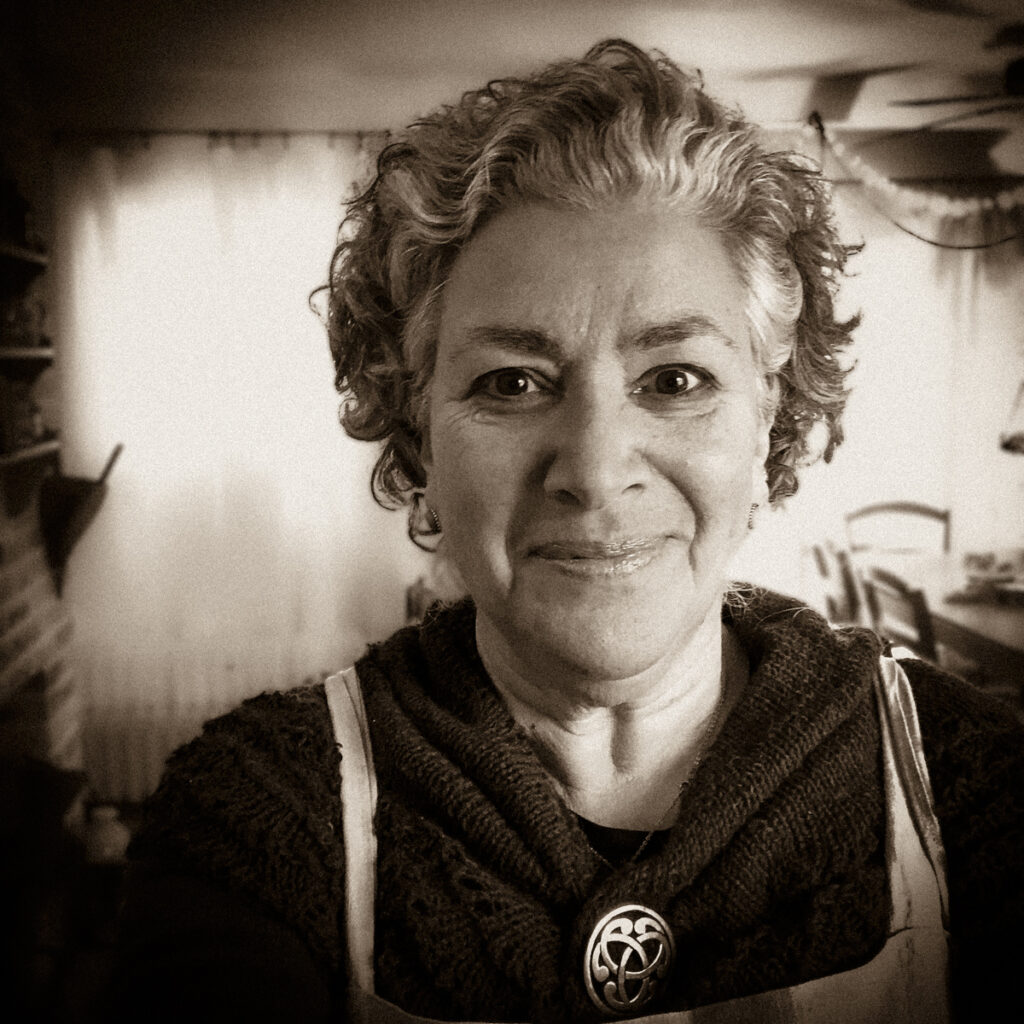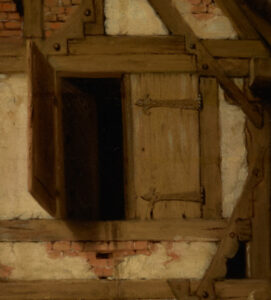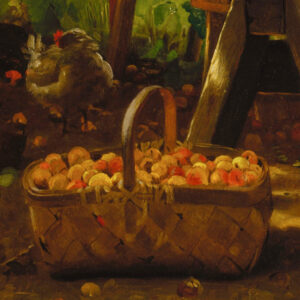To Be a
Sacred Space
A Discussion with Leila Marie Lawler

Hearth & Field recently spoke with Leila Marie Lawler, a wife, mother, grandmother, and popular author and blogger. Mrs. Lawler shared her perspective on the challenges that face young mothers and fathers today as they try to rear their children in a culture that lacks wholesome customs and collective memory.
Hearth & Field: Over the years you have written on a remarkably wide spectrum of practical and philosophical topics, from pantry management to applications of Aristotle; from what to do when your preschooler won’t put on his shoes to how to find affirmation when everything just feels too hard. What unites this broad range of interests for you?
Mrs. Leila Marie Lawler: The unifying thread in all my interests is, I suppose, my conviction that there is unity in our souls and in our experience. I’ve never believed that it’s foolish to die on this little hill, whatever it may be, as people are always cautioning — my motto is, “I will die on all the hills!”
Less dramatically, I observe the patterns of life and how they repeat in what is small and what is large, in the everyday and in the ultimate — and I notice that the interest we take in the former has a bearing on our ability to penetrate the latter. “He who is faithful in little will be faithful in much” — true on so many levels.
I suppose I have a positively medieval conviction that reality is really coherent, and often it coheres through analogy. There is also its surprising refusal to submit to flat rationalism (but rather to be splendidly reasonable). This belief is what led me to coin that phrase, “Order and Wonder” — not that I thought about it, but rather just blurted it out one day.
All in all, it’s a mistake to look for “the one thing you need to know,” in the current fashion made popular by the appetite for clicks on one’s posts. Instead, the truth about life is that it’s a paradox and definitely in tension on this side of Heaven: no sooner do we try to nail down one aspect (“I will just confine myself to worrying about the budget and menus, and let more profound matters alone”) than the other pops up (“Mommy, but where is God?”).
The “thing” I am trying to get across might be mundane and it might be sublime. But because whatever it is really does interest me, I go for it. And it’s true: I really do love to talk about all those things you mention — whether it makes sense to use up what’s in your pantry before going shopping (it doesn’t, normally) or whether history really is arcing toward an ever better future (it’s not, and thinking it is guarantees that it will be quite a bit worse).
We live within a hierarchy of goodness, from the most humble to the most exalted, an order in which we ourselves have a place, and in that hierarchy we find, unexpectedly, wonder, the wonder that leads us to contemplate the love that moves the sun and the other stars.
H&F: So one day you blurted out “Order and Wonder,” which really does capture something profound, this balanced coherence you’re describing — and now that phrase is part of the subtitle of your Summa Domestica book series. Tell us a little bit about yourself as a young mother of several children, prior to your writing career. What were you like then, before you had hit upon this concept of order and wonder? What were your greatest blessings and challenges?
Mrs. Lawler: I was very idealistic and not very competent in practical matters! I loved to read, including to my children of course, and to sew and fix up furniture, something my mother and aunts always did. But I had zero discipline. I could cook but in a laughably unrealistic way; having pored over Julia Child, I could debone a chicken, make rillettes, and reduce a sauce, but as to putting a square meal on the table at a reasonable hour, no.
My stepmother had a baby when I was ten and another when I was thirteen, so at least I had some memory of her very practical approach — otherwise, I had, like many women of that time and now, really not seen a baby since I stopped babysitting in middle school. My mother was a fierce proponent of breastfeeding, having bucked all the authorities when she had me in 1960, so there was that.
I didn’t know how to keep house. I try in my book to tell some of the stories so readers can at least have a good chuckle and disabuse themselves of the idea that I was born with any sense at all. I really had no clue. But by the time my third child came, I realized I had to stop waiting for my mother to rescue me, and that my husband could maybe benefit from having a wife who wasn’t hopeless. I had to figure things out.
I realized I had to stop waiting for my mother to rescue me, and that my husband could maybe benefit from having a wife who wasn’t hopeless. I had to figure things out.
H&F: Did you know other young mothers at the time, working through similar things?
Mrs. Lawler: I didn’t know how to make friends. I was alone and lonely for the most part, though when I was expecting my second child I started to meet some women with whom I could relate. I don’t think I was a very good friend! I really feel sorry for the people who knew me — hopefully they forgive me.
One thing is that we lived in Washington, DC, in those days (the very early 80s); and it was a very working-mother sort of place, while I knew I would not pursue a career, despite having been well indoctrinated in a second-wave feminist ideology. I just knew I could not and did not want to leave my babies.
We were in the political world, and the women I met were decidedly career-minded. It might be hard for some people to imagine life without the internet to connect you to kindred people and ideas, but that’s how it was. Since I grew up an only child of divorced parents, very much left to my own devices, I didn’t have good social skills. I really had to learn almost everything as I went along.
H&F: You must have been a very adept on-the-job learner. Fast forwarding then, you began most of your writing career around the time your older daughters reached adulthood, around 2007. What had changed for mothers in our culture and society by that time?
Mrs. Lawler: By then, it was a given that women of our milieu would have careers, because their own mothers did. These young women’s entire childhoods had been about excelling and advancing (this goes for men, too). We have an ambitious system for our children. They had been told that it was beneath them to learn housekeeping — if it ever came up. I have so many emails from young women now thanking me for teaching them how to become competent in homemaking, as their mothers actively discouraged the knowledge. Remember, having been raised in that hippie manner, my approach is to be reasonable and do your best, because an orderly home allows for the peace necessary to live and for children to grow and learn in all the ways we desire.
But something began breaking through. I started to see in the burgeoning online world a trend of crafting blogs, in which this younger generation (maybe fifteen years behind me) was rediscovering home comforts and skills, but not the necessary worldview to support it. I could sense their anxiety over this contradiction. Many were homeschooling, but their philosophy of child-rearing was straight out of the 60s and 70s, with its smashing of authority and parental roles. As a few years went by, you could see conflict over having another child, even though they loved their family life.
This disconnect — between what they clearly wanted and how they thought — made me want to tell whomever found me some things I had learned — being myself an escapee from secularism, Freudianism, second-wave feminism, the sexual revolution, and so on. To most of these bloggers, even the Catholic ones, those ideas seemed valid or not really assailable; to me, the destructive tendencies were all too clear.
H&F: In other words, aspects of homemaking were increasingly visible and celebrated in these blogs, but the philosophy underpinning the praxis was missing, or misguided.
Mrs. Lawler: Yes. And I was concerned that many of these young women were being drawn into offering advice to their followers on matters other than craft. They were quilters and potters and homesteaders, but still very young, with very young children. (In some cases, I felt that the children had an insufficiently protected online presence through their mothers’ blogs.) I enjoyed these blogs quite a bit, but when the comments would turn to questions of how to balance creative work and child-rearing, some of what was said made me feel like I was watching the train wreck I grew up with, all over again.
H&F: The blogosphere (and “influencer” culture in general) is rather prone to train wrecks.
You mentioned the appetite for clicks on one’s posts: such a model creates an incessant need to produce content, even when it’s not well-informed, even when it’s dangerous. It would seem then that your own blog, Like Mother, Like Daughter, which you started in 2007, must have been your response to what you’re describing — sound philosophical underpinnings to counter the faulty ones. Some sturdier tracks under the train.
In any case, for better or worse, blogging and similar digital mediums make up much of society’s current conversation and, in a sense, our collective modern literature. You’ve also authored a number of books, of course, but as a writer, what are your thoughts on blogging itself? How do you go about it?
Mrs. Lawler: When I began to write on the blog, I realized that here was my bespoke medium. I have a sense of the audience, and it allows me simply to express whatever is on my mind, in my own way.
My guiding principle all along has been to try to say what others may not be saying. The world is full of trite advice and conventional observations that either aggressively adhere to the norm or are just plain full of wrong ideas. Why should I add to that? It’s such a waste of everyone’s time. And we simply can’t go on for very long discussing tips for discipline or even why I should be the one to dust my home if we don’t have a coherent understanding of authority, affection, family life, childhood, and ways of knowing.
I have the sense that there are many out there searching for that way of “living differently,” as dear Pope Benedict put it, and that when I write about what is on my mind, there is the possibility of connection.
The world is full of trite advice and conventional observations that either aggressively adhere to the norm or are just plain full of wrong ideas. Why should I add to that? It’s such a waste of everyone’s time.
H&F: So you try to make the connection by saying what others aren’t saying.
Mrs. Lawler: I try to say what I wish would be said — often, what I wish had been said to me before I went through the seemingly unnecessary complications of my life. Doing so isn’t easy, especially in more formal or academic writing; I have tried it and struggle to find my voice. If I’m not just saying what is on my mind, blog-style, I immediately get bogged down in the scholar’s duty to source and cite everything, which to me seems an endless and daunting task, one that usually silences me when I attempt it, though sometimes it is a necessary undertaking and is done well by many.
C. S. Lewis comments in his advice to one of his youthful correspondents, “If you become a writer you’ll be trying to describe the thing [the “jewel” — the thing you are actually trying to say] all your life: and lucky if, out of dozens of books, one or two sentences, just for a moment, come near to getting it across.”
My site and subsequently my books are my place to say what’s on my mind in the hopes of striking that luck he speaks of, without the strictures even of a magazine or newspaper column, where eventually the deadline really does deaden. The format of an online journal fits my personality pretty well. I’m not writing for a publication with a particular theme or for an editor who has the job of keeping me in line. So I do go on!
H&F: So . . . do go on.
Mrs. Lawler: From the beginning, I wanted to express what I thought by making a place where I could gradually offer what I had learned. Through my sharing of everyday things I was doing, I wanted to give readers a sense that one doesn’t have to settle for chaos in raising children and making a home, on the one hand, but neither should one expect perfection, on the other. I wanted the site to offer a slow and peaceful pace so any interested reader could get to know who I was and what made me think I had anything to say. I do get serious at times, but mainly I try to keep it light. Life is so peculiar. We might as well laugh!
This is not my normal mode, though; I mean, laughing is, but taking things slowly is not. Usually I am polemical, choleric — I have my list of things to say! If you had asked me ten years before what my writing ambitions were, I would have said I saw myself writing essays or articles.
But I somehow found another vision, surveying the blogging world, which was clearly reaching many, of what would have helped and attracted the young me; I felt I had a responsibility to her, that young person, not to overwhelm her, but to let her know I understand how she feels. So that’s what I pursued.
H&F: And that works because whether you’re speaking to the young you, a generation back, or to a young adult today, the advice is the same. Are the challenges also perennial? Have they gotten any better or any worse since the days of younger you?
Mrs. Lawler: I’d say the main challenge — the insistence that motherhood and homemaking hinder a woman from realizing her full potential — is still there. It’s worse because the gatekeepers have honed their thought-stopping rhetoric. If someone dares raise an objection, it’s quickly shot down in a manner that doesn’t allow for more discussion, because things get put on a personal plane or characterized as hurtful or insensitive.
After the recent lockdown period, things are much worse for young mothers because pressure is bearing down in all directions. The process of pregnancy, childbirth, and taking care of young children is much more difficult on a purely practical level, as unreasonably complicated as it was before. Men suffered a blow that is hidden from public view; the burden of working somehow fell more squarely on women. In general, we are far less free; even if people aren’t quite consciously aware of that, there is a general anxiety.
Things are better because, ironically and sadly, women are so evidently unhappy and unfulfilled that it takes a truly insensitive person to ignore the situation. I always think it’s best to know what your task is, to know the truth. And for those who can see, it becomes more clear every day that, as my friend Stella Morabito puts it, “the Little Mother prevents Big Brother.” The woman in the heart of the home is the best defense against all I’ve described, and more, that we have.
The benefits are, as always, incalculable. Taking care of one’s own family, making a home — these have always been a true calling, one built into the very nature of being a woman. Not every woman will marry (some choose the consecrated life; some find themselves single), and some mothers will do wage-work or other work outside the home, but every woman has within herself the desire and calling to make a shelter for others and to be in fact a sacred space. The young mother par excellence is Our Lady, and Mary’s many names all point to her role as sacred place.
The wonderful thing is that it doesn’t require an intensely introspective sort of personality or flair to carry out the mission of making a home. It comes naturally, as we can conclude by the enormous effort, exerted at maximum level in every corner of life crescendoing for a hundred years now, to suppress the inclination. If it were normal for a woman to deny her nature, the task would have been accomplished long ago and we’d have moved peacefully on.
The wonderful thing is that it doesn’t require an intensely introspective sort of personality or flair to carry out the mission of making a home.
H&F: No, our current cultural moment does not often bring to mind the words “moved peacefully on.”
As you say, many women feel unhappy and unfulfilled. And even in the best of situations, mothers face particular hardships that come along with the privilege of bearing, nursing, and nurturing their young children. But a society that does not value — and often even ridicules — these sacrifices, can make fruitful suffering feel like futile misery.
Fathers see this and want to be of help, but they sometimes receive confusing messages about what that looks like. What can fathers do to be most effective in supporting their wives as they face these challenges?
Mrs. Lawler: The world sees the binary relationship of man and woman in terms of power and conflict. The Christian man must internalize the reality, demonstrated in the starkest way possible by Our Lord Jesus Christ who died on the cross for love of us, that being the man of the family means dying to self for the other. Every day he needs to pray that he be able to act out of a desire to serve, not a desire to exert power.
My husband willingly changed diapers, brought me glasses of iced tea, washed dishes, and hauled laundry when we were in the throes of those early years with all their chaos and sheer work. But I would say that the best things he did for me were, first, to trudge along to work no matter what and, second, to express openly how much he admired me and thought I was doing a great job being a mom (by no means true, but very encouraging!).
A husband’s willingness to learn to see what is needed — a room that could use a vacuuming, a toddler who needs a snack or a nap, a sink full of dishes that needs washing — are so helpful in those early years. It’s normal for the husband to help his wife this way; just as it is for her to realize, for instance, that if her hormones allow her to return quickly to sleep after nursing the baby in the night but he has a tendency to lie awake long after getting up to help, it might be best for her to spare him from night wakings when she can.
Stepping back from the question of what particular things a man can do to help his wife, I want to say that in general, the best thing he can do relates to the manly calling of providing and protecting. His service to her, speaking in terms of their vocation together, is to assure her of his willingness to provide for her and their family, and to protect them against any force whatsoever that threatens them.
The husband should cultivate an appreciation of the wife’s nurturing graces; and the wife should be ever mindful of the incredible burden the husband carries, of being responsible for the well-being of the entire family, before the eyes of the world and before God.
H&F: Do you think that aspects of this are prefigured earlier in life? You’ve written about rearing teenage boys and teenage girls. What have you found to be similar and what have you found to be different in boys’ and girls’ needs during their upbringings?
Mrs. Lawler: The similarity is in the real change in how we relate to our children as they approach adolescence. We are used to thinking of this stage in almost purely physical terms, but a change in spirit is happening as well, or rather, an unfolding of the personality, which of course has another dimension besides the material one. Ultimately, this time is about the growth that leads the child to discover his path to God — it becomes manifest, though it doesn’t look like it, and that’s where the conflicts and frustrations come in.
As we observe in every stage of development, change isn’t a smooth process. We wish it would be. Yet the toddler has to fall down, cry, resist, have tantrums, and so on — for us in our fallen nature, growth is a kind of purgation. We have to understand that a similar trajectory occurs in adolescence, but the bodies are bigger and our sense of control is far diminished.
One’s sex is an inextricable aspect of one’s being. Boys and girls experience very different things during adolescence. The mother is used to managing everything in her child’s life, but during this phase, she has to allow her husband to impart his wisdom and his presence to the child, in the different ways their growth demands. She has to step out of the way — not easy for her to do — while maintaining her fundamental intimacy with her children.
We could say that on a fundamental level, however remotely (but not as remotely as we think), each child at this point is learning to love and is preparing for the destiny of becoming a spouse and father or mother, as the case may be. In the home, young people learn the virtues they will need later.
Perhaps a child of ours will never marry, or, marrying, not be given physical children. Perhaps he or she will be called to the celibate life of the priest or consecrated religious, foregoing marriage and children for the Kingdom. Yet the development of the person is the same, as all are called to fulfill the nuptial meaning of our being — a meaning that reflects, as St. Paul tells us, a great mystery of God’s love for us. Each boy must become a man who participates in the Fatherhood of God; each girl must grow to be a spiritual mother like Our Lady. In the teen years, parents have a duty to form them for this future.
How delicate this time is!
H&F: In your writings, you seem to have identified two missing relationships in our parenting culture: mentor-mentee relationships, and strong peer relationships. What can people of different ages do to try to meet the need for in-person mentorship and peer support?
Mrs. Lawler: Women are well suited to form relationships. We need to recover our place in the community. Our neighborhoods are empty and those on the margins are suffering because of it. Women, young and old, should stake the ground and seek out friends — and be bold in doing so. Older women should generously and graciously share their experience and knowledge; younger women should be attentive and seek them out. We should all help each other!
On the blog we have a way of encapsulating the means of doing this which we call the St. Gregory Pockets. It’s nothing new; we just gave it a name. There’s no membership fees or swag. It’s not a movement. We just tried to articulate the things we have learned (recovered, really) about making friends, with an eye to helping each other in our current, often isolated predicaments; as well as trying to form bonds that will provide peers for our children as they grow. It’s not enough to have a book club, nice as those are. We have to build something together that includes taking care of each other, bringing each other meals, having dances, making music, strengthening the liturgical life, and sharing our sorrows and joys.
I am blessed in having found, a bit later in my journey (my eldest had already gone to college), a community of families that have a lot of faith, look out for each other, and provide a way for their children to be friends with each other. One of my goals on the blog and in The Summa Domestica was to try to convey the general and perfectly normal ways this is accomplished.
H&F: You often use the phrase, “If I can do it, so can you!” And you talk not only about how to care for others but how to nourish and attend to yourself as you do so. Balance seems to be key. How can we commit to doing our duty without falling into perfectionism and the “all work and no play” mentality?
Mrs. Lawler: When I say, “If I can do it, so can you,” I mean I am not by any means setting myself up as a perfect homemaker, mother, home educator, or what have you. My aim is to encourage that distracted, unsure person who fears getting trapped in some sort of unreal world with no escape from comparison.
I offer my journey towards competence — that is all. If we seek perfectionism, we lose our peace. But if we give up and say that homemaking and caring for children doesn’t matter — a sort of “bless this mess” attitude — we merely put off the day of reckoning, when we actually have to dig ourselves out of the chaos in order to accomplish anything and avoid victim status.
My observation is that what really holds women back from devotion to family and home is an unacknowledged sense of a lack of competence. When we learn to clean a toilet properly, we don’t have to fall back on an elitist scorning of cleaning toilets. Someone has to do it! Done lovingly and without continual dread due to not knowing how it’s accomplished, it is just not that big of a deal, and, to my mind, preferable to a lot of drudgery women consign themselves to in the name of casting off the shackles of yesteryear.
But what I mostly want to say about striking the right balance is this: I am not the arbiter of such things. I can only offer a bit of my experience, which is obviously quite limited. Blessedly, God gave a way for each one of us to know what to do about our own life. It’s remarkably simple. He gave us six days to do, strive, act, and tackle life here in this world. He commanded us to have one day, Sunday, to worship, rest, and celebrate. If we regard the six days of the week as preparation for this day of rest, and truly live it as he intends — making worship the focus, resting and enjoying each other’s company (having done what is necessary on those other days, e.g. finding kids’ church shoes by Saturday and so on), even though of course, a mother’s work is never done — he will give us the wisdom to sort things out.
H&F: Just starting with that one thing — working, then resting on Sundays — will make a difference?
Mrs. Lawler: It won’t happen all at once, but it will happen. Life gets direction when lived this way. This one principle of order — making Sunday a day truly set apart, different from the other days — will bestow order in the rest, especially in terms of our own attitude and ability to make good decisions. After all, we have to have the goal in mind if we are to choose rightly. That’s what our Sunday is for us here on earth: a way to live the truth that our goal is heaven.
H&F: You and your husband not only raised seven children, but are now the grandparents of a growing clan as well. What are your goals as a grandmother?
Mrs. Lawler: Yes, we are expecting our nineteenth grandchild. Such a blessing! My goals are to try not to forget birthdays, to try to show each one of them that we love them, and to support our own children as they raise them. I am so relieved to find that they are all good parents — far better than I ever was. I hope and pray that we have established a dynasty of our own, and I encourage everyone — knowing as I do what it is like to be in the thick of things, when it hardly seems possible even to survive the week — to have a vision for your own personal clan, tribe, lineage, kingdom, or whatever you wish to call it. What we do “in here” (in our homes) has far-reaching implications and is a truly sacred undertaking. It is a privilege to be at the heart of it.


Leila Marie Lawler is the author of The Summa Domestica: Order and Wonder in Family Life, among other books, and maintains the popular blog Like Mother, Like Daughter. She lives with her husband in Massachusetts, where she does her best to practice her “kitchen-sink philosophy” despite currently having no kitchen sink due to ongoing home renovations.



















